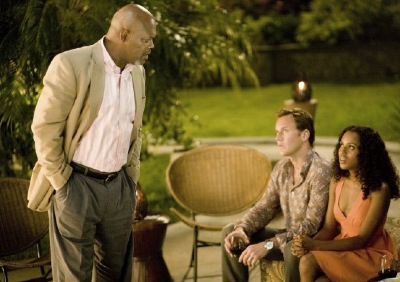Warning: spoilers after the jump.
It feels as if Samuel L. Jackson has spent the last few years sliding into self-parody in formulaic big-budget films, so I was keen to see him exercise his craft in Lakeview Terrace, an exploitative little thriller set in the LA suburbs. Likewise with its director, Neil LaBute, who caused a stir fifteen years ago with misanthropic indie movies like In the Company of Men, but whose last credit before this was a nasty-looking remake of The Wicker Man, which I refused to see on principle. The idea of both men reminding us why they’re worth watching by getting back to basics is very appealing.

Lakeview Terrace pushes on the pressure points of race relations. Young bi-racial, college educated, hybrid-driving couple Lisa and Chris Mattson (Kerry Washington and Patrick Wilson) have just moved from Oakland to the LA suburbs and are celebrating their freedom from the supportive but smothering influence of parents. Abel Turner (Samuel Jackson) is their cop neighbour, a friendly and authoritative lawman who works a tough beat in the inner-city and spends his off-duty time policing their suburban neighbourhood for fun. But of course, in films like this suburbia is never what it seems on the surface. The threat to normality is present from the very beginning, as Lisa and Chris check the reports on the summer wildfires to be sure that their new home is safe.
Abel quickly develops some kind of resentment for Chris. Outwardly it seems it’s because Chris throws the butt of a furtive cigarette onto Abel’s lawn, but it finally emerges that it’s because the white boy is married a black woman, and that just ain’t right. Patrick Wilson and Kerry Washington do a very good job as the optimistic young couple, and their chemistry is well-judged, but there’s no doubt that this movie revolves around Jackson.
Beneath his stern-but-loving family man exterior, he is a seething mass of problems and contradictions. When his kids see his new neighbours getting it on in their outdoor pool he mounts a subtle campaign to unsettle them and drive them from the neighbourhood. There’s no doubt that Samuel L. Jackson has all the best lines, and he deserves them as his performance ripples through the shifts in mood of a very everyday, very complex character. Chris’ polite efforts to negotiate are instantly shut down by Abel and turned into humiliations which grow more severe with each attempt. The growing unreason leads to an appropriately volatile finale, and it’s Jackson’s performance that keeps us watching through the gathering cloud of anxiousness.
Abel’s biblical name suggests very strongly that this is a film in which the brother who was killed works his revenge. There have been, as with anything that gets this close to the bone of a contentious issue, reductionist complaints that the film is racist. The character of Abel is racist, but this is just a fraction of his psychosis. It seems clear enough to this viewer that Lakeview Terrace deals with the way attitudes change. Lisa and Chris do not yet carry the baggage of older generations, but are in danger of being saddled with it — not just by Abel, but by Lisa’s father too. Often films that deal with racism feature an upbeat ending in which understanding triumphs unreason. There are two things taken for granted in such endings: one is that racism is bad, and the other is that it can be overcome. What is discomfiting about Lakeview Terrace is not that it supports racism — it doesn’t — but the suggestion that our optimism in our efforts to overcome it may be unfounded.

